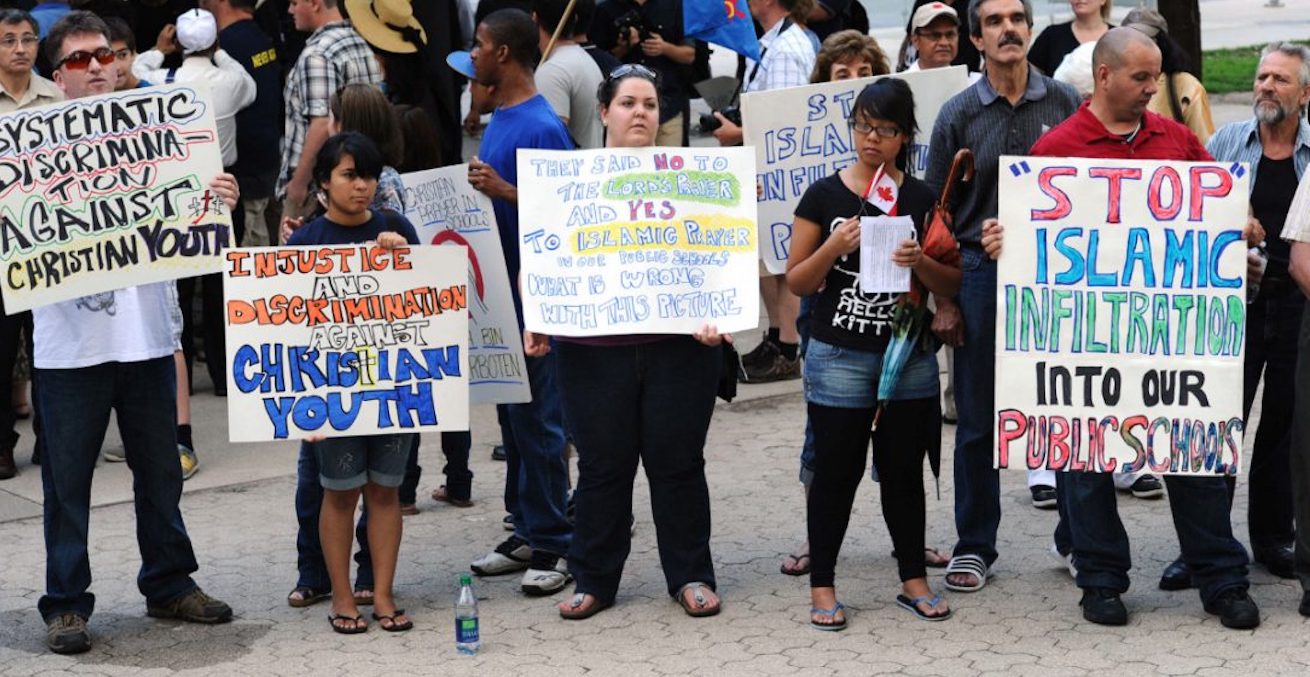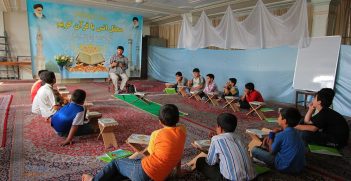The State of Religion in Politics

The separation of church and state isn’t the same as separating religion from politics. Countries that have enshrined secularism have found themselves discussing religious architecture, law and clothing.
What is the common thread between two Indonesians whipped for gambling, a young man sentenced to jail for planning a terrorist attack in Sydney, and an attack on refugees in Sweden. A similar thread runs through the comments of prominent figures in Britain concerning the law and social cohesion, Turkey’s latest military operation in Syria, the death of a policeman in France, and a scholarly discussion about India’s first inhabitants?
Religion is still relevant in the 21st century, though in different ways to 500 years ago. Church affiliations in some Western countries may be on a downward trend, but since the 9/11 attacks in the United States, those 19th century predictions about religion appear inaccurate. The decline of affiliations to Christian churches in Western Europe does not fully represent a reality which is different in the United States, Central Europe and other regions of the world.
The ‘culture wars’ in the United States and elsewhere, led to massive emigration from North African and Middle Eastern countries towards Europe, and widespread terrorists declaring religious motives reveal that religion not only did not disappear from democratic public spheres but is back on stage. In fact, they have become crucially relevant for the well-functioning and future preservation of those societies: in one way or another, they must be faced.
The set of questions and discussions that religion has brought to 21st century democracies does not exactly coincide with the new globalists and nationalists divide, though it may intermingle with it in different ways. Globalisation has facilitated the movement of people with religious backgrounds across the planet. Nationalism—or more specifically collective cultural identities which may or may not coincide with nations—has created the challenge of maintaining cohesive societies which once were cultural homogeneous.
Even at the theoretical level, some of the key assumptions upon which democratic polities rest—such as the principle of secularity—become contested by the presence of new religious citizens who place the essence of their lives outside the immanent frame (the default belief in many modern Western societies that material reality is all there is, with the non-material or transcendent, including the religious, realms considered just a human invention).
The challenges to Western democracies exemplified by the immigration of millions of new or future citizens with strong cultural backgrounds which do not fit the secular (immanent) assumption, invite urgent reflection on the way ahead. Wishing away those cultural differences will not solve them.
A starting point to address them might be the search for commonalities with those new groups and cultures. Most Western democratic societies have in common a cultural background that can not only be traced back to the very beginnings of modernity, but that has been present in the conformation and development of European and other democracies, at least until very recently. With the emergence of Christian democracy, Western and particular European polities had a first-hand experience of “the problem of religion” in the public sphere, and how to deal with it.
Of course, simply equating the appearance in Europe of Christian groups into the postwar politics of the mid 20th century with the arrival of Islamic immigration from North Africa in the first quarter of the 21st century would be anachronistic and misleading. The groups in question, their cultural backgrounds, the nature of their religions and the specific circumstances in which each of them has come to prominence in the public sphere of Western democracies are different, and this fact could not be stressed enough.
And yet there are coincidences relevant enough so as to reveal possible courses of action before the ‘religious problem’. The Christian traces present in both the remote and the recent past of Western democratic polities which today are mostly secular and live “as if God did not exist”. Secular societies that do not become secularist can continue living within their immanent frame while accepting the possibility that a different realm—that of the transcendent—might exist too.
Acknowledging the religious dimension that is essential to important minorities of citizens does not mean that the society that acknowledges it has to become religious. It only means that it is open to the possibility that other Weltanschaunngen (world views) might be valid. And such acknowledgement by the majority that these world views could be valid—even if not shared by them—calls for a reciprocal duty for religious minorities to adhere to basic rules of the game without which the receiving democratic societies would cease to exist as such the rule of law, freedom of speech, freedom of and from religion, and so on.
Religion-related headlines are becoming common in the 21st century, disturbing the lives and dogmas of secular societies, and challenging them to transform themselves without losing their democratic essence. On reflection, however, these secular societies are historically not devoid of the experience of religion: they should use it to deal with the new situation.
Dr Pablo C Jiménez Lobeira is an adjunct lecturer at the Institute of Ethics & Society, University of Notre Dame Australia.
The article is published under a Creative Commons Licence and may be republished with attribution.





